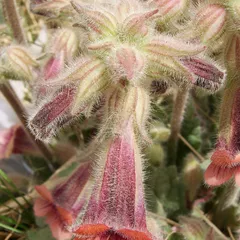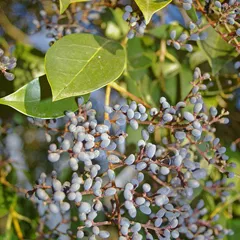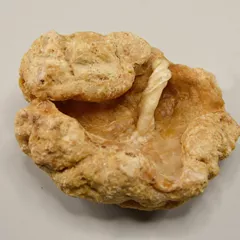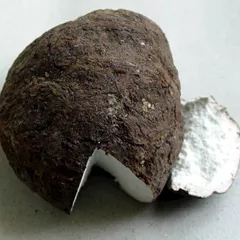Kidney-Deficiency
The information provided here is not a replacement for a doctor. You shouldn't use it for the purpose of self-diagnosing or self-medicating but rather so you can have a more informed discussion with a professional TCM practitioner.
Pathology
Kidney-Deficiency is a pattern of disharmony in Chinese Medicine.
Chinese Medicine views the human body as a complex system that tends toward harmony. A pattern of disharmony is a disorder that prevents that harmony from occurring.
Patterns give rise to symptoms that may at first glance seem unrelated from a Western standpoint but that actually make a lot of sense when one understands Chinese Medicine theory. For instance here Kidney-Deficiency gives rise to such diverse symptoms as scanty periods, pale menstrual blood, back pain and knee pain (as well as fifteen others).
To diagnose a pattern, analyzing a patient's pulse as well as their tongue is common practice. In the case of Kidney-Deficiency patients tend to exhibit deep (Chen) or weak (Ruo) pulses as well as a pale tongue.
Patterns aren't exactly the Chinese Medicine equivalent to Western diseases, they're rather the underlying causes behind diseases or health conditions. Here Kidney-Deficiency is thought to sometimes induce conditions such as abnormal uterine bleeding or scanty menstruation.
Diagnosing Kidney-Deficiency
Diagnosing a pattern in Chinese Medicine is no easy feat and should be left to professional practitioners. In particular one has to know how to differentiate between different types of pulses and tongue coatings, shapes and colors as well as learn to read from a long list of seemingly unrelated symptoms.
Pulse type(s): Deep (Chen) or weak (Ruo)
Tongue color: Pale
Main symptoms: Tinnitus Back pain Knee pain Dizziness Sore back Pale face Cold limbs Weak knees Amenorrhea Late period Malar flush Night sweats Restlessness Scanty periods Feeling of cold Frequent urination Pale menstrual blood Thin and watery periods Feeling of heat in the evening
Treating Kidney-Deficiency
Herbal formulas used to treat Kidney-Deficiency



The top herbs in Zuo Gui Wan are Prepared Rehmannia (Shu Di huang), Goji Berries (Gou Qi Zi) and Cornelian Cherries (Shan Zhu Yu)
Zuo Gui Wan
Source date: 1624 AD
Number of ingredients: 8 herbs
Key actions: Nourishes the Yin. Strengthens the Kidneys. Fills the Essence. Augments the marrow.
Formula summary
Zuo Gui Wan is a 8-ingredient Chinese Medicine formula. Invented in 1624 AD, it belongs to the category of formulas that nourish Yin and tonify.
Besides Kidney-Deficiency, Zuo Gui Wan is also used to treat Kidney Essence Deficiency or Yin Deficiency.



The top herbs in You Gui Wan are Prepared Aconite (Zhi Fu Zi), Cinnamon Bark (Rou Gui) and Deer Antler Glue (Lu Jiao Jiao)
You Gui Wan
Source date: 1624 AD
Number of ingredients: 10 herbs
Key actions: Warms and tonifies Kidney Yang. Replenishes the Essence. Tonifies the Blood.
Formula summary
You Gui Wan is a 10-ingredient Chinese Medicine formula. Invented in 1624 AD, it belongs to the category of formulas that warm Yang and tonify.
Besides Kidney-Deficiency, You Gui Wan is also used to treat Kidney Qi not Firm or Yang Deficiency or Empty Yang.



The top herbs in Er Zhi Wan are Glossy Privet Fruits (Nu Zhen Zi) and Eclipta Herbs (Mo han lian)
Er Zhi Wan
Source date: 1534 AD
Number of ingredients: 2 herbs
Key actions: Nourishes Liver Yin. Nourishes Kidney Yin.
Formula summary
Er Zhi Wan is a 2-ingredient Chinese Medicine formula. Invented in 1534 AD, it belongs to the category of formulas that nourish Yin and tonify.
Besides Kidney-Deficiency, Er Zhi Wan is also used to treat Kidney Yin Deficiency or Kidney and Liver Yin Deficiency causing Heat in the Blood.



The top herbs in He Che Da Zao Wan are Human Placentas (Zi He Che), Tortoise Plastrons (Gui Ban) and Poria-Cocos Mushrooms (Fu Ling)
He Che Da Zao Wan
Number of ingredients: 11 herbs
Key actions: Tonifies the Kidneys. Strengthens the Directing and Penetrating Vessels. Regulates the periods.
Formula summary
He Che Da Zao Wan is a 11-ingredient Chinese Medicine formula. It belongs to the category of formulas that tonify Yin and Yang.
Besides Kidney-Deficiency, He Che Da Zao Wan is also used to treat Kidney and Liver Yin Deficiency or Spleen or Kidney Qi Deficiency.



The top herbs in Liang Di Tang are Unprepared Rehmannia (Di Huang), Ningpo Figwort Roots (Xuan Shen) and Dwarf Lilyturf Roots (Mai Dong)
Liang Di Tang
Source date: 1826 AD
Number of ingredients: 6 herbs
Key actions: Nourishes Yin. Cools Blood. Stop bleeding.
Formula summary
Liang Di Tang is a 6-ingredient Chinese Medicine formula. Invented in 1826 AD, it belongs to the category of formulas that nourish Yin and tonify.
Besides Kidney-Deficiency, Liang Di Tang is also used to treat Heat in the Blood or Kidney Yin Deficiency.



The top herbs in Dang Gui Di Huang Yin are Dong Quai (Dang Gui), Prepared Rehmannia (Shu Di huang) and Cornelian Cherries (Shan Zhu Yu)
Dang Gui Di Huang Yin
Source date: 1640 AD
Number of ingredients: 7 herbs
Key actions: Nourishes Blood. Tonifies Kidney and Liver Yin. Regulates the menstrual cycle.
Formula summary
Dang Gui Di Huang Yin is a 7-ingredient Chinese Medicine formula. Invented in 1640 AD, it belongs to the category of formulas that tonify Blood.
Besides Kidney-Deficiency, Dang Gui Di Huang Yin is also used to treat Kidney Yin Deficiency or Liver Blood and Kidney Essence Deficiency.



The top herbs in Shi Quan Da Bu Tang are Milkvetch Roots (Huang Qi), Atractylodes Rhizomes (Bai Zhu) and Poria-Cocos Mushrooms (Fu Ling)
Shi Quan Da Bu Tang
Source date: 1180 AD
Number of ingredients: 10 herbs
Key actions: Warms and tonifies Qi. Warms and tonifies Blood.
Formula summary
Shi Quan Da Bu Tang is a 10-ingredient Chinese Medicine formula. Invented in 1180 AD, it belongs to the category of formulas that tonify Yin and Yang.
Besides Kidney-Deficiency, Shi Quan Da Bu Tang is also used to treat Qi and Blood Deficiency.
Special highlight: the link between scanty menstruation and Kidney-Deficiency

Dong Quai (Dang Gui) is the key herb for Dang Gui Di Huang Yin, a formula used for scanty menstruation caused by Kidney-Deficiency
Typical symptoms for scanty menstruation caused by Kidney-Deficiency: Tinnitus Back pain Knee pain Dizziness Sore back Scanty periods Frequent urination Pale menstrual blood
Recommended herbal formulas: Dang Gui Di Huang Yin Shi Quan Da Bu Tang, He Che Da Zao Wan, Dang Gui Di Huang Yin
Kidney Yin Deficiency can be the result of hereditary weakness, overwork under stress or having too many children or abortions too close to each other. With this pattern, Body Fluids is depleted and Kidney Essence fails to fill the 'Sea of Blood' and the Penetrating and Directing Vessels. Thus periods become scanty.
Even though the mentioned symptoms are typically caused by Kidney Yin Deficiency, this pattern name is just Kidney Deficiency. It is because Kidney Yang and Yin are interdependent...Read more about scanty menstruation
Special highlight: the link between abnormal uterine bleeding and Kidney-Deficiency

Prepared Aconite (Zhi Fu Zi) is the key herb for You Gui Wan, a formula used for abnormal uterine bleeding caused by Kidney-Deficiency
Typical symptoms for abnormal uterine bleeding caused by Kidney-Deficiency: Tinnitus Sore back Pale face Dizziness Cold limbs Weak knees Amenorrhea Late period Malar flush Night sweats Restlessness Feeling of cold Pale menstrual blood Thin and watery periods Feeling of heat in the evening
Recommended herbal formulas: You Gui Wan, Zuo Gui Wan, Er Zhi Wan, Liang Di Tang
Kidney Deficiency is one of the major causes of abnormal uterine bleeding. The Kidneys can be lacking of either Kidney Yang or Yin or both at the same time. Women who have experienced long childbirth and lost a large amount of blood are most susceptible to this pattern.
In case of Kidney Yang (or Qi) Deficiency, the Directing and Penetrating Vessels can not contain Blood as they're supposed to and thus the Blood leaks. For younger girls, it can be due to hereditary Kidney weakness. While for...Read more about abnormal uterine bleeding
